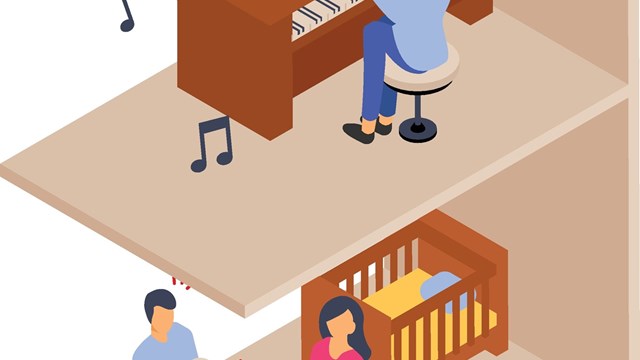
We all have nightmares. Whether it's hungry sharks nipping at our feet or shadowy figures lurking in the woods, there will always be things that wake us in the middle of the night. If you're a co-op or condo owner, manager or board member, your nightmares may be a bit more specific; perhaps they involve feuding board members, or contractors gone awry, or worst of all, a tangled web of litigation that gets more snarled the more you try to free yourself.
These legal nightmares are even scarier when they land on your doorstep for real. If not dealt with properly, disagreements or arguments between neighbors or board members can escalate, eventually landing before a judge and causing a world of financial and emotional hurt.
No matter how grisly the tale, though, there are almost always ways in which it could have been avoided. And for every bad experience—at least in the real estate world—there's usually a lesson to be learned.
Tales from the Co-op/Condo Crypt
You would think that new buildings would be less prone to legal nightmares than their older counterparts. After all, people are just moving in, the paint is still fresh, the board members are collegially learning the ropes side by side. The truth is that the newness factor in and of itself can be the root cause of a variety of potentially litigious issues.
Attorney Adam Leitman Bailey of Adam Leitman Bailey PC in Manhattan has seen some of the trouble that can arise when building communities first come together. He represented a Tribeca condo erected by a first-time builder. After the residents moved in, problems began to arise almost immediately. The boiler didn't work and there was no cold water. The roof was leaking, causing water to drain into multimillion-dollar properties, destroying hardwood floors and making life unbearable for those who lived there. And because the building was new, there was a brand-new board in charge—the members of which were about to get a hardcore initiation into handling bad situations.
When the builder initially dragged his feet on making repairs, Bailey and the board drew up a 30-page document outlining everything that needed to be done to bring the building up to par. "The board really had to work as a board," Bailey says. "They had to get complaints from individual units, bring everyone together and be organized."
After more cajoling and pressure that included The New York Times threatening to run a story on the poor condition of the building, the contractor relented and attempted to make the repairs. When those repairs still did not solve the problems, he agreed to cover the costs of the repairs after another flurry of letters from Bailey. "We extracted all the money necessary from the builder to get these repairs made," Bailey says. Eventually, the residents who had invested so much money in their new homes could finally begin enjoying them.
A Word of Caution
One of the main lessons learned, Bailey says, was that of caution. The problem could have been avoided if the residents had not agreed to move into the building before an engineer had inspected it and said it was okay to do so. "But most unit owners have contracts saying they can move in as soon as the certificate of occupancy is ready," Bailey says. He encourages residents to negotiate a contract that says they do not have to occupy the building until an engineer can certify that everything is in good working condition. "There's power in numbers," he says. And the sponsor and his or her contractor will be more motivated to fix any problems if they arise simply so that they can get the unit owners into the building and paying monthly maintenance.
It also helps to have a savvy board that keeps the lines of communication open and also has an eye for detail. In another case in which a building had severe structural problems—the promised 12-foot ceilings somehow ended up being seven feet, among other things—Bailey says the board knew enough to collect the warranties from all the unit owners so they would know who to contact to make repairs. They made sure to get that documentation from the builder, something not all boards do. They also maintained a steady stream of communication, creating Yahoo.com chat groups so they could stay in constant touch with one another and with residents. Information and communication are both keys to the kind of effective negotiation that can get a case settled before it enters the courtroom—something that can save a lot of time and money in the long run.
The Checks Were Here a Second Ago…
Attorney Marc Schneider of Marc H. Schneider PC Attorneys at Law in Garden City tells a tale of how incompetence nearly brought a homeowners association to its knees. The HOA was an umbrella covering two different condo organizations. It was a new construction, and while the board was being put together, the sponsor hired went ahead and hired a managing agent.
When the agent began doing things like collecting common charges for condo #1 and condo #2 but leaving a significant number of those checks uncashed, it quickly became apparent that the agent did not have a firm grasp on their duties. It got even worse when the agent began mixing funds from condo #1 to pay for expenses for condo #2. By the end of the manager's tenure, it was revealed that they had been holding hundreds of resident checks for months, leaving bills unpaid. Confused residents were left wondering why their checkbooks weren't balancing. Things came to a head when the managing agent authorized an increase in common charges without a board vote because more money was needed to pay the expenses—despite the fact that there were thousands of dollars in uncashed checks at the agent's disposal.
Schneider says he helped bring about the termination of the agent and also worked with the sponsor and an accountant to sort out the tangled web of paperwork left behind. "The situation was ultimately cleaned up," Schneider says. "And the buildings now have very healthy reserve funds. The sponsor made good on all legal fees incurred, as well as accounting fees—he was just as upset as everyone else that this happened. But it had a very happy ending for the community."
As Always, Communication is Key
That happy ending was made possible because of good communication. From the moment the problem became apparent, "The [sponsor and board] communicated to unit owners and let them know what was going on," Schneider says. "It came at a very difficult time, because the board was just learning what went into running an HOA. When I came into it, it was still a sponsor-controlled board, but the sponsor communicated. And a group of unit owners stepped up and got involved."
In the future, that board knew what questions to ask of their next manager—what financial functions they'd be expected to undertake, how frequently they should be visiting, how often they'd be communicating with the board, and what the monthly management report will look like. "You have to make sure that the people asking questions have an understanding of what the expectations are," says Schneider.
The other key to the happy ending rested in the trust that the sponsor and board put in their legal counsel and their accountant, Schneider says. It's important to turn to professionals you can trust and then trust them to get the job done. "Also," adds Schneider, "patience was also very important, recognizing it wasn't a problem to be solved overnight."
Keep that Racket Down!
Perhaps the most common cause for legal wrangles that can turn into legal nightmares involves noise. Lots and lots of noise. As builders cut costs and use less noise-reducing materials between walls and floors, the number of noise complaints in the city's co-op and condo buildings has risen over the years. Worse than leaky roofs, worse than misplaced checks, noise is the thing that can drive people to the edge of madness, causing neighbors to turn on one another with a fury reminiscent of a George Romero monster movie.
And in a city where eight million people are crammed in shoulder-to-shoulder, these problems are bound to happen. "People in this city are stacked one on top of the other, side by side," says Al Pennisi of Pennisi Daniels & Norelli LLP in Rego Park. Noise issues can erupt from a variety of things like "children, music playing, dogs barking, TVs, treadmills," Pennisi says. "Everyone's different."
When the situation gets bad, "boards will come to their counsel saying they want to do something about it," says Pennisi. "They want us to serve a notice to cure, telling the person they're breaching the rules of conduct."
The notice to cure will give that resident 10 to 15 days to rectify the problem. "Then ten days may go by, and they're still playing bongos at midnight. Now the building wants to evict that person from their property." The goal is not necessarily to get those people into court, but to get them at the very least to commit to an agreement compelling them to abide by the rules.
What a lot of residents do not understand is that each and every infraction of something like a noise rule must be documented and logged if a legitimate case is to be built against the offender.
"No court is going to evict a person for random infractions," Pennisi says. "It has to be a chronic condition, documented with live witnesses. The court needs a live person or persons to testify to it" if that person will ultimately be forced to leave. And the argument can not just be between one neighbor and another. "More than one person has to be affected by the noise," Pennisi says.
One way to prevent these ugly noise issues from arising is to ensure that the rules are being followed in each and every unit. Most co-ops and condos have rules stating, for example, that you have to have carpeting covering 80 percent of the apartment's floors—basically everything except the kitchen, bathroom or hallway—in order to cut down on noise. Also, people have to be willing to show common courtesy and remember that living in close proximity means making adjustments for those around them.
And that's good advice for avoiding legal nightmares in general: remembering common courtesy. It's also a matter of protecting oneself by looking ahead, asking questions, keeping lines of communication open and trusting the professionals who can solve their problems and, with any luck, keep them out of court.
Liz Lent is a freelance writer and a frequent contributor to The Cooperator.









2 Comments
Leave a Comment